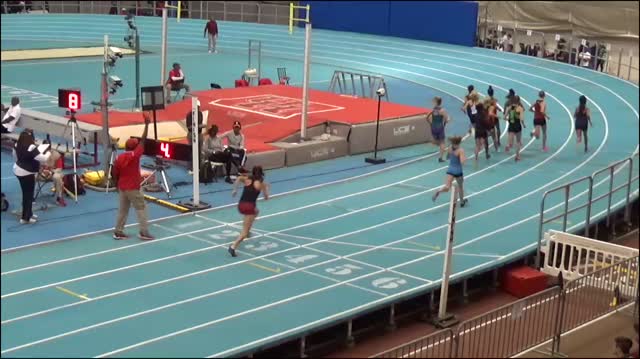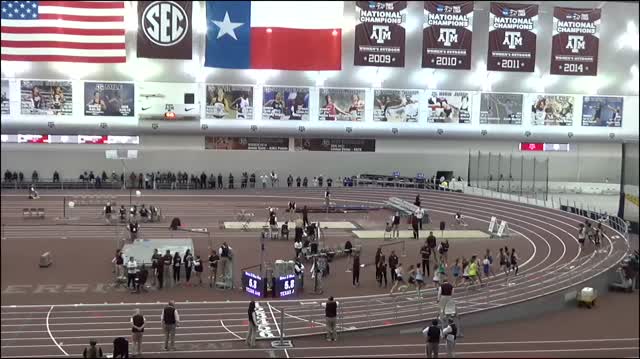
With some of the best collection of talent in the nation, Texas' UIL Class 6A cross country state championship is one of the hardest races to qualify for in the country.
To qualify requires a lot of sacrifice, hard work, determination, and putting one's body through intense training and training conditions.
But on Monday, October 22, Cypress Woods senior Mary Rodriguez qualified for the Class 6A state race as the 10th and final individual qualifier from Region 2-6A. She was 25th overall with a time of 18:48.34.
She put her body through the same torture, made the same sacrifices, and trained through the same humid and hot conditions in the Texas summer months.
And her reward was knowing that she went through the same qualifying processes as every other 6A state meet qualifier.
But what makes her different, and what makes this story unique, is also what makes her journey so special.
* * *
When The Same Isn't Quite The Same
At the state meet, Rodriguez will warm up, line up, and run on the same course as the rest of the 5A and 6A girls.
However, this is where the similarities will end.
Rodriguez won't have the same routine as most athletes: Eat, sleep, and wake up. In fact, she hasn't done that in a long time.
For over a year, she had slept as much as most, but narcolepsy (a condition that still wasn't diagnosed) had forced her to sleep even more. And when she did, the turn in effectiveness was significant.
"I was sleeping 14 hours on the weekends waking up and taking naps throughout the day, sleeping through classes, and after school, no matter how much sleep I had got the night before," Rodriguez said.
Somewhere along the line, her life had changed.
"I started falling asleep in class, during meetings, and during church, which wasn't normal for me."
She would eventually go through several attempts at finding a resolution.
"I went to the doctor, the first thing they tested for was iron deficiency and vitamin D deficiency." She would get supplements and then take time to enable them to take effect. However, thing would still not be the same and Rodriguez' sleep issues would continue. Some would chalk it up to her getting back to training for cross country and her body trying to get accustomed to the sport and suggested she get more rest.
As things worked out -- the more she rested, the more rest she continued to require.
"I would wake up, go to practice, go to class and I would fall asleep several times in a about two classes each day. My friends would hit me to wake me up or get me on video falling asleep."
Her academics were also impacted by the condition.
"In class, I wouldn't retain any information from about five minutes before or five minutes after falling asleep. After school, I'd have to go home and retake notes or get explanations from friends on homework that I missed in class (while sleeping), that took 2-3 hours everyday, plus the homework I already had." If that wasn't enough, there would be more and more to each evening for Rodriguez. "I'd have to take a nap or two while doing my homework because I was just so tired. Then, I'd eat, shower, and go straight to sleep, because I'd be so tired the next day."
* * *
Narcolepsy Diagnosis
Almost a year had gone by and still there was no improvement.
Rodriguez would see more doctors and seek more treatment. She eventually was part of a sleep study and an EEG. Doctors believed she was having absent seizures, which were eventually ruled out. The concern then went to her having brain wave malfunctions, which led to a second EEG. The malfunctions were eventually ruled out.
"Don't settle, don't let the negativity seep in. Keep your positive mindset, keep working, set your goals and achieve them. There is almost nothing anybody can tell you to make it better, so you have to tell yourself. You have to tell yourself that you're going to keep pushing and keep working and that it's going to be worth it in the end."
-Mary Rodriguez, Cypress Woods senior
Without a resolution to the diagnosis, or any kind of insight to what was going on, she continued living her daily life. The daily rounds of being a student, athlete, and daughter....school, practice, church, everything, it was being affected by how she felt. And it was also the fact that nobody was able to learn what was plaguing her.
But after going through a full cross country season, track season, and a school year while enduring her daily activities, a break would finally come.
An overnight sleep study would reveal she was without a doubt Narcoleptic. Her brain was no longer producing hypocretin, the hormone that regulates deep and normal sleep.
* * *
Difficulty of Finding A Resolution
The long road of not knowing what was technically wrong was finally over, but her attempt to regulate and enable her to proceed wasn't.
Rodriguez would now have to adjust her eating, training, study, and believe it or not even her sleeping habits.
She would have to take medication that would have a heavy effect on the athletic realm of her life, which would ultimately affect her studies. The medication would cause nausea and other complications that would call for adjustments in other areas of her life.
Rodriguez would have to adjust her eating and sleeping habits to able to make room for her medication. Regulations on when to eat before and after taking medication and sleeping would have to be planned. Those plans would have to be coordinated with waking up in time to eat before cross country practice and meets so the nausea wouldn't have as much of an affect on her practice and racing.
It took this entire season to experiment with the timing and dosage of the medication.
* * *
More Adversity
Before the narcoleptic issues, Rodriguez dealt with other extraneous adversity situations that made her life difficult. Sometimes, it seemed like giving up would have been easier than continuing her athletic career.
As a sophomore, Rodriguez and her Cypress Woods team qualified for state. All things on the athletic front were looking good. However, late during that season, she would experience pain in her hip and it would last throughout the year. After the conclusion of her sophomore year, she would seek medical treatment. It was discovered that she had an impingement in her right hip.
"After discussion and planning, I went in for surgery." After surgery, physical therapy, and rehab, Rodriguez would find her way back to running, but it wouldn't be without incident.
The surgery to repair her labrum and to shave down two bones as well as the ensuing rehab would put her out for a year, as she missed her entire junior cross country season.
"I wasn't able to walk for about a month," she said. "I wasn't able to sit up straight or anything for about a month after that."
The road to recovery and back to running would become even longer than expected, too.
"I would do physical therapy 2-3 times a week to get my muscles retrained because they were compensating for my hip."
Although, it was a very slow process, it was just a year ago this month, Rodriguez began to run again.
"November was the first time I could run, I started running one minute, then running two minutes, and eventually ran up to 5 minutes. In December, I was getting back to running two times a week and eventually made it to be able to run every day."
And her senior season has been full of highs. She won the Seven Lakes Invitational on Sept. 1 in a season best time of 19:13.76. Weeks later, she was fourth at the Kempner Cougar Classic on September 28 in a time of 19:55.29.
Her 25th place finish at the UIL Region 2-6A Race, and her career best PR of 18:48.34 for 3-miles was the icing on the cake.
This weekend, Rodriguez will share the amazing moment of the state cross country meet course with many athletes. It was just last year that she was sitting at home, unable to run while this meet was being run.
She knows the road of getting back to the state meet has been a long and difficult road. But in life, the easy route isn't always the best one, and cross country has taught Rodriguez that.
This sport is about adversity and challenging times. Often times, when things get hard in life people don't want to cross that line, but Rodriguez decided to do just that.
To that, she says, "Don't settle, don't let the negativity seep in. Keep your positive mindset, keep working, set your goals and achieve them. There is almost nothing anybody can tell you to make it better, so you have to tell yourself. You have to tell yourself that you're going to keep pushing and keep working and that it's going to be worth it in the end."





